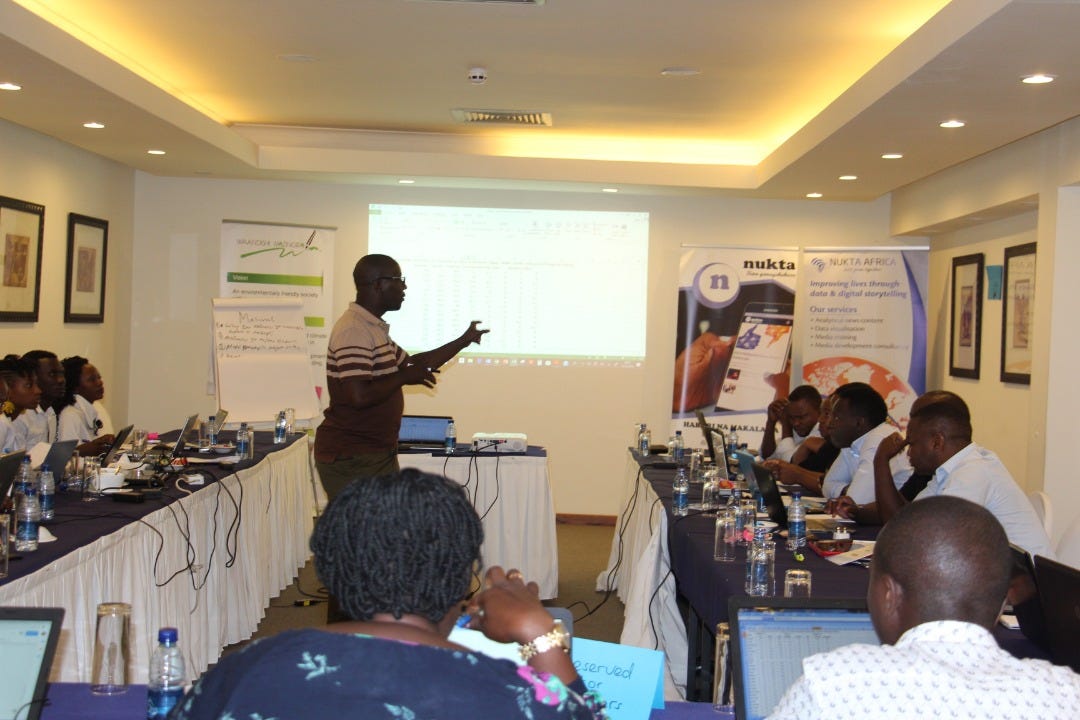By Tulinagwe Malopa
Two years ago a team of journalists and technologists spotted a gap in an online media industry in Tanzania. As youth, they couldn’t get useful data-driven information on news platforms, specifically blogs that could help them make decisions and give them insights on business and technology.
In a bid to cover the gap, they decided to initiate a digital media and technology company that would deal with searching for potential impactful content hidden in data also known as Data Journalism. That company is what today is called Nukta Africa.
To implement the idea, they created a Swahili data-driven news site dubbed Nukta Habari which started publishing data-driven stories aimed at improving the lives of people. The platform is among the fastest growing news sites in Tanzania on business, technology, education, safari and data-driven content.

On average it produces 1,000 analytical stories on the platform www.nukta.co.tz in Swahili of which 75 percent are data-driven.
Maphosa Banduka, Nukta Africa’s Co-founder and Chief Finance & Administration Officer says they decided to start with Nukta Habari because of the existing gap at that time in the media specifically on data.
We also wanted to make sure all articles that were created improves the lives of people, she said.
“Our role is not only to inform the public. We aim to analyse and clearly use data on issues of public interest to help people make right decisions on different aspects of life,” she added.
The website recorded 1,300 percent annual growth between 2018 and 2019 and the editorial team is aiming for higher this year by creating more insightful content.
Writing stories to fill in the information gap on Swahili blogs or news sites would not only solve the problem in the East African nation.
Though they are players in the news business in Tanzania, Nuzulack Dausen, the Co-founder and CEO of the company says they decided to help other journalists to gain more skills on data and digital storytelling.
“We understand that our data and digital journalism skills would have helped us to be more competitive in the market but we said ‘no, we need to help our colleagues to have basics on these emerging storytelling techniques,” Dausen said.
“We decided to offer digital and data journalism training to other journalists and media companies which are interested in what we are doing. It is not about competition, it is a matter of sharing skills to survive.”

The company provides training to journalists and media houses on important skills that will help them when reporting and developing content for their audience. Also, it is offering a special training package for NGOs and corporations on advocacy storytelling and narrative storytelling on Corporate Social Responsibility (CSR) and other corporate success stories.
Since its inception the company has been offering media training on data journalism, fact checking, data visualisation, advocacy storytelling, renewable energy reporting, solution journalism and multimedia reporting.
The courses, according to Dausen, have been designed to suit the current journalism and communication needs due to the recent digital disruption.
“Our training services are meant to improve journalism and communication sectors mostly on using digital tools, data and other emerging storytelling techniques. Initially these kinds of skills were acquired abroad and trained by our colleagues from Europe or America but we have now brought them home,” Dausen said.

Since data visualisation is not common in Tanzania, Nukta Africa wanted to push communicators to start embracing this fast growing communication tool.
The company has invested in telling stories through data visualisations and infographics which makes another product in their portfolio. The main purpose of learning and investing in this new way of storytelling is to deliver a message as quickly as possible to the targeted audience or customers.
To ensure others benefits from the visualisation service, the startup since the first quarter of 2019 started offering data visualisation and infographics services to organisations in Tanzania.
All these three products are aiming at one goal of transforming people’s lives by using digital and data-driven tools.